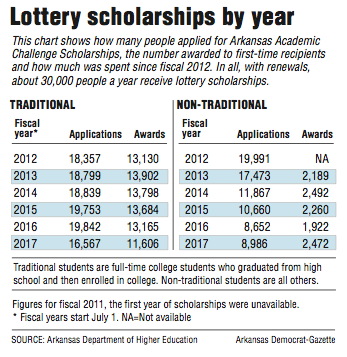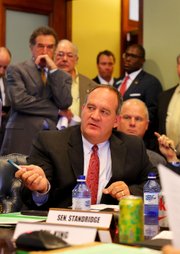Because of a change in state law on eligibility, fewer high school graduates are applying for and receiving scholarships funded by the state lottery, according to state Department of Higher Education records.
The number of recent high school graduates awarded the Arkansas Academic Challenge Scholarship for this fiscal year dropped by 1,559 over the previous fiscal year to 11,606, records show. And the number of applications by those traditional students dropped by 3,275 to 16,567, according to the records. The scholarship is funded with proceeds from the Arkansas Scholarship Lottery.
Traditional college students are those who enter college after graduating from high school. Nontraditional students are the rest of college students -- for example, those who delay entering college -- and their numbers are up.
Act 1105 of 2015 -- sponsored by Sen. Jimmy Hickey, R-Texarkana -- requires high school graduates, starting with the class of 2016, to have ACT scores of at least 19 or the equivalent on comparable college entrance exams to be eligible for the scholarships.
High school graduates previously were required to have completed the Smart Core Curriculum and achieved either a high school grade-point average of at least 2.5 or a minimum score of 19 on the ACT or its equivalent.
Department of Higher Education Director Maria Markham said the decline in traditional students awarded the scholarships this fiscal year as compared with last fiscal year "is due to the change in eligibility requirements to just a 19 on the ACT."
In February, then-department Director Brett Powell told lawmakers that "eliminating the GPA requirement for recipients will -- our best estimate is -- eliminate about 1,800 students from the scholarship."
Under Act 1105 of 2015, the scholarship size for future recipients was reduced from the previous $2,000 to the current $1,000 for the freshman year at two- and four-year colleges. The scholarships were increased from the previous $3,000 to the current $4,000 for the sophomore year at four-year colleges and from $2,000 to $3,000 for the sophomore year at two-year colleges. Scholarship recipients receive $4,000 as juniors and $5,000 as seniors at four-year colleges.
The number of nontraditional students awarded scholarships increased this fiscal year by 550 over last fiscal year to 2,472, and applications rose by 334 to 8,986, according to department records.
That's "probably because more funds were available to fund this population based on awards of traditional awards going down due to more stringent academic requirements," Markham said.
During the 2015 regular legislative session, proponents of Act 1105 said it would provide an incentive for students to successfully complete their first years of college and help guard against the scholarship program running short of funds. Critics of the measure have said they're worried that it will hurt poor and minority-group students.
Hickey said Friday that he hadn't seen the department's figures showing a decline in the number of traditional students awarded the scholarship this fiscal year.
The state had many scholarship recipients going to their first years of college and not returning for their second years, and lawmakers had "to help correct the cash flow in the lottery" during the 2015 session, said Hickey, a retired banker.
He said the recent high school graduates who didn't receive the $1,000 scholarships for their first years in college can earn the scholarships during their second, third and fourth years by earning at least a 2.5 grade-point average.
House Speaker Jeremy Gillam, R-Judsonia, said he expected declines in the number of recent high school graduates applying for the scholarships and being awarded one, but he didn't recall "any metrics."
In February, Powell told lawmakers that the department expected to hand out $84 million to $85 million in Arkansas Academic Challenge Scholarships in fiscal 2017, which started July 1 -- a dip from the $97 million it expected to hand out last fiscal year.
That projected decline was largely based on the changes in eligibility requirements and reduction in amounts awarded future first-year students, Powell said back then.
"Moving $1,000 from year one to year two [for future scholarship recipients] will have a tremendous impact on the first year of awards," Powell told lawmakers.
The department estimated that the scholarships handed out in fiscal 2018 will rebound to about $97 million, he said in February. The department distributed $99.7 million in scholarships in fiscal 2015, which ended June 30, 2015.
By comparison, the program handed out more than $100 million in scholarships in each of fiscal years 2011-14, with a peak of $132.5 million in fiscal 2013, Department of Higher Education officials have said.
Gillam said he hasn't heard of any suggestions from lawmakers about changing the eligibility requirements again, so he's assuming that key lawmakers, such as Rep. Chris Richey, D-Helena-West Helena, and Hickey haven't made any final decisions.
He said he favors a "wait and see approach" to determine whether the lottery's rebound is sustainable.
Richey could not be reached for comment by telephone Friday.
But Hickey said he doesn't favor changing the eligibility requirements, and he is drafting a few lottery-related bills for the legislative session, which starts Jan. 9.
He said the legislation would create a trust account for excess proceeds beyond what's needed to fund the current program and set aside the money for a year for lawmakers to determine whether the additional money is sustainable. The Legislature would decide how to distribute the additional proceeds based on a percentage to specific groups of students, such as for first-year or second-year students or for workforce education, rather than a dollar amount to "help us navigate" the annual fluctuation of lottery proceeds, he said.
More than 30,000 students receive the scholarships each fiscal year -- first-time scholarship recipients plus renewed scholarships.
The program is financed with the Arkansas Scholarship Lottery's net proceeds, plus $20 million a year in state general revenue and a $20 million lottery reserve fund that covers temporary cash shortfalls.
The lottery started selling tickets on Sept. 28, 2009, and its net proceeds peaked at $97.5 million in fiscal 2012.
Its revenue and net proceeds dipped each of the subsequent three fiscal years before they rebounded in fiscal 2016 with the assistance of a world-record Powerball jackpot in January. The lottery's net proceeds totaled $85 million in fiscal 2016.
During the first four months of the current fiscal 2017, the lottery's revenue totaled $140.5 million -- up from $134.3 million in the same period in fiscal 2016.
So far in fiscal 2017, the lottery's net proceeds have totaled $25.1 million -- up from $23.9 million in the same period in fiscal 2016.
For fiscal 2017, lottery Director Bishop Woosley is projecting revenue at $463.4 million and net proceeds at $80.9 million.
In November, lottery officials signed a contract with Camelot Global Services to develop a business plan and help implement it. The company has offices in London and Philadelphia.
Camelot's self-described ambitious business plan projects lottery revenue at $463 million in fiscal 2017, $517 million in fiscal 2018, $556 million in fiscal 2019, $581 million in fiscal 2020 and then $615 million in fiscal 2021. It forecasts net proceeds for college scholarships at $81 million in fiscal 2017, $93 million in fiscal 2018, $99 million in fiscal 2019, $104 million in fiscal 2020, and $109 million in fiscal 2021.
SundayMonday on 11/13/2016




